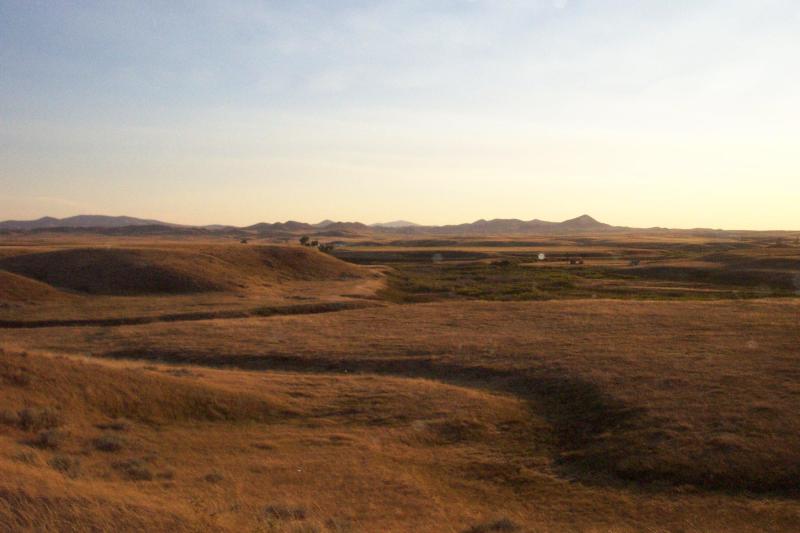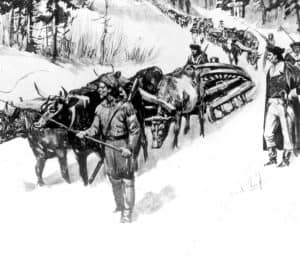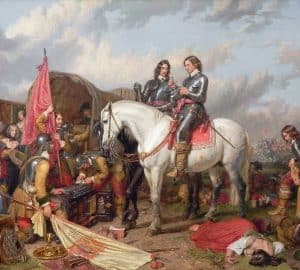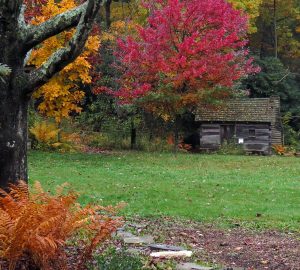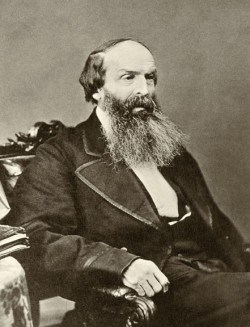
All was deathly silent in the small village of Kamiah, in what would one day be the state of Idaho. A neat white chapel testified that the Gospel of Jesus Christ had come to Idaho territory. The fir trees and silent mountains stood around the house of worship as people stood in quiet groups, talking, praying, and pointing to a little house framed with simple boards and roofed with cedar. Inside that house, a man was dying.
This man was Henry Harmon Spalding, the beloved pastor of the Nez Perce Indians. He was on his deathbed, and the people he loved were gathered around, awaiting the end. Slowly, a tall Indian rode into the clearing around the church and made his way toward the house. This was Chief Timothy, once a savage, but now a Christian. Let us follow him into the house and observe the scene.

Inside the house we find an old man propped up in a bed. His beard flows down to his chest, and his eyes are sunken and hollow. He knows eternity is near. But when his eyes see Timothy, they brighten and sparkle with the gleam of renewed vigor. Timothy was Spalding’s first convert to the Gospel, and he has proven faithful. The old missionary and the old chief look at one another in silence, for there are no words to express their thoughts.
It is said, that in the final days of life, the mind rushes back to early memories. The sight of old Timothy has brought back a flood of memories to the veteran missionary. He remembered the distant village on the east side of the continent where he had been born, an illegitimate child. He remembered his own conversion to the Gospel, and the first time that he as a young man had heard about the people that lived west of the Rocky Mountains. He remembered the young lady, Eliza Hart, who had agreed to become his wife and cross an unknown continent at his side. Eliza was waiting for him in heaven, and Henry would see her soon.
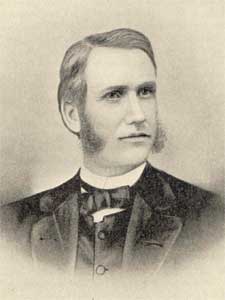
As Henry continued his remembrance, he remembered the day, forty years earlier, when he and his fellow missionary, Marcus Whitman, and their wives had left all they had known to bring the Book of God to the Indians of the Northwest. He remembered his first sight of the rugged mountains, the first grizzly bear, the first hostile Indian. Many troubles had been weathered and many hardships endured in his long pilgrimage on earth.
He carried some scars in his body as well as in his soul. It is not an easy thing to be a pioneer missionary in a hostile land. But Henry had always risen to every challenge. When most of his comrades had died or gone home, Henry Spalding had stayed.
A friend who knew him well once said that he was “inured to hardship from infancy.” The veteran missionary had been chased by bears, thrown by horses, hunted by savages, and distrusted by his own companions. Even his fellow-laborer, Marcus Whitman, had often misunderstood and slandered him. Working closely together on a foreign field is always hard, and differences of opinion can divide good men. The drive and zeal of Henry Spalding made him clash with anyone whom he considered as lacking zeal. Marcus Whitman sometimes viewed Henry as proud, uncompromising, and cantankerous.
But when Marcus’ daughter Alice Clarissa drowned in a creek, Henry made a hard 120-mile trip through the mountains to comfort his grieving friends. Beneath his rough beard, sunburned face, and fiery eyes there was a soft heart. Henry mingled his tears with those of Marcus and Narcissa as he preached the funeral of the little girl from the tender text, “Is it well with the child? It is well” (II Kings 4:26).
So firm was his love to the Whitmans that Spalding entrusted his own eldest daughter to their care, and the girl had been with the Whitmans on the fateful day of their martyrdom at the hands of the Cayuse in November of 1847.
Henry and his wife Eliza were threatened with death numerous times, but the Lord had delivered them to carry on the work. Their own mission compound, called Lapwai, was protected by converted natives like Chief Timothy who would not let hostile hands touch their beloved teacher.
While Marcus and Narcissa Whitman went to an early martyrdom and reward, the Spaldings were left on earth to continue the task of taming the west with the Bible and the hoe. After losing his beloved wife Eliza in 1852, Henry continued, “steadfast, unmoveable, always abounding in the work of the Lord” (I Corinthians 15:58). Over his long and faithful ministry in the Northwest, he lived to personally baptize over 1,000 converts. His ministry extended beyond the Nez Perce tribe to embrace the neighboring tribes of the Cayuse, the Spokane, the Walla Walla, the Yakima, and the Couer d’Alene.
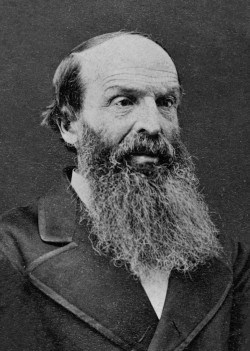
Henry had lived to see the wilderness of Oregon reach the status of statehood. By the time of his death, the transcontinental railroad had been laid. The mountains over which he had once walked on foot beside a mule were now crossed by trains. On his last trip east in 1871, the old missionary had gazed in wonder as the landscape slid past the window of his comfortable railcar. On this trip to the east, the old missionary was hailed by large crowds wherever he went. He was welcomed by august bodies of statesmen and stood before the U. S. Senate as well as the General Assembly of the Presbyterian Church. He always preached to crowded churches, telling the people the fascinating story of the mission work in the Northwest and the blood of martyrs that had hallowed that ground. Spalding pled that the work was not over, and that the west could not be won with the railroad, barbed wire, and the Winchester rifle, but that the Gospel of Jesus Christ, and that alone, could tame the wild frontier. The U. S. Senate applauded his efforts and all the famous newspapers sang the praises of the old missionary.
But Henry Spalding would not bask in personal glory. He set his face toward the western sun and returned to his old station at Lapwai, wanting to die at his post of duty. Indeed, his last years were some of his most fruitful, as he began to train a host of young Nez Perce pastors and teachers who would continue his work.
Even at the age of 70, old Spalding worked as hard as ever. That year, he travelled more than 1,500 miles on horseback. He lived with the Indians, slept on the hard ground, ate their food, and taught them the Book of God. He gave the Nez Perce a written language and translated large portions of Scripture for his beloved people. He also taught them to sing, and Henry loved nothing better than to sit in that white frame church and hear the sweet songs of Zion being sung by his converts.
Gentle singing now called the old man out of his memories. The loved ones about his bed were singing a favorite hymn, a hymn loved by his wife Eliza, now awaiting him in glory, “The delightful day will come, When my dear Lord will bring me home, And I shall see his face.”

Near Henry was his well-worn Bible and his journal. The last entry of that journal was written with a shaky hand, telling of the baptism of several natives from the Umatilla tribe. Interestingly, the final two natives, a warrior and his wife, who were baptized by Spalding took the Christian names Marcus and Narcissa Whitman. Under this baptismal record, the final words of Henry’s journal were these, “Bless the Lord, oh my soul.”
Over the dying missionary, Chief Timothy stood reverently, his dark cheeks wet with tears. He had joined in the singing, and now he opened his copy of the Gospel of Matthew, translated by Henry into the Nez Perce language, and offered his pastor a few words of comfort from the Book of Books. The old chief then joined his hand with the hand of the old missionary and gave his teacher these final words of parting:
You are my great interpreter. You was sent by God to me and to this people, to teach us life, the Word of God. You are going first. God only is good and great. Jesus alone gives life. Now don’t be concerned. I will never turn back. My wife will never turn back. This people will never turn back.
With these words echoing in his heart, Henry Harmon Spalding finished his earthly pilgrimage and entered the eternal rest that is reserved for the people of God. He was buried at Lapwai, his old mission station, under a grove of trees, and his grave is carefully maintained by a grateful people to this very day. He had committed the truth to faithful men, men who would teach others also.
The churches that Henry Spalding started still stand today, and there are Nez Perce pastors alive and preaching today in the Northwest who gratefully trace their heritage to his influence. Nez Perce National Park now marks the place where Henry Harmon Spalding lived and labored.
“Blessed are the dead which die in the Lord from henceforth: Yea, saith the Spirit, that they may rest from their labors; and their works do follow them” (Revelation 14:13).
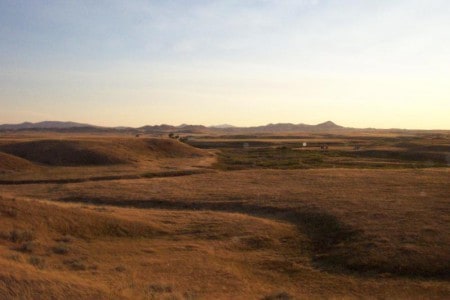
Bibliography
Henry Harmon Spalding by Clifford Drury
Marcus and Narcissa Whitman and the Opening of Old Oregon by Clifford Drury


